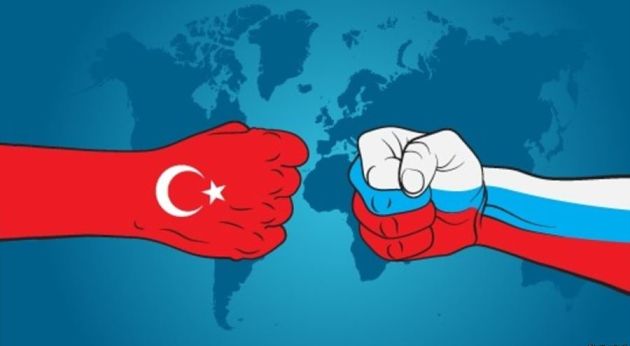The new chill in Turkey-Russia relations, which experts have been writing about for a long time amid the disagreements between the two countries over Idlib and the Mediterranean, is now being recognized by the mainstream media. A very telling article in this regard is the one by the head of the Turkish Institute of Russian Studies, Professor Salih Yılmaz, titled “The British Factor is Beginning to Manifest Itself Again in Turkish-Russian Relations,” which was published not just anywhere, but on the website of the state-owned TRT, including its Russian-language version. In it, the professor warns, using rather strong language for such analysis, that Turkey will turn its back on Russia if it continues its “bearish” policy in the region: “…the fact that Russia is focused solely on its own interests may lead to the emergence of new players who can fill the resulting void. The chances of these players, such as Britain, convincing Turkey are increasing. Russia will lose Turkey if it seeks only to profit from the sale of arms.
But what is particularly interesting about the professor’s argument is that he directly points to the dependence of Turkey’s relations with Russia and Britain, which, according to him, are competing for influence over Turkey. This is in line with what we have been writing about for many years in our coverage of Turkish and Middle Eastern politics in general, and is particularly resonant with public opinion in Turkey due to the rise to power in London of the new Prime Minister, Boris Osmanoglu Johnson.
However, Moscow has also been quite outspoken about Turkey. For example, the well-known Telegram channel Nezigar, which regularly posts various Islamophobic nonsense while being known as a media platform for certain pro-Kremlin circles, wrote the following yesterday: “Russia and Turkey have an extremely low level of mutual trust. Russia does not consider Turkey a strategic partner. The policy of pan-Turkism contradicts Russian interests. Turkey’s support for the separatism of the Crimean Tatars and its interference in the affairs of the North Caucasus are seen as truly hostile.”
We will not comment on the blatant nonsense about Turkey’s interference in the affairs of the North Caucasus, from which it has long distanced itself so as not to inadvertently offend the importer of Turkish tomatoes, or the accusation of “supporting Crimean Tatars’ separatism,” which is probably meant to be understood as Turkey’s commitment to the international community’s position on Crimea’s affiliation with Ukraine and its attempts to protect the interests of Crimean Tatars who found themselves under Moscow’s rule without coming into conflict with it.
What is important is the fact that the pro-Kremlin leak channel is writing about what all level-headed people have long known – except for a few ethnic Turks or Eurasian romantics in the Russian establishment, or certain groups historically prone to Islamophobia and Turkophobia, no one has ever perceived or perceives Turkey as a friend and ally, even if tactical rapprochement with it is necessary.
Speaking about the reasons for the cooling between Russia and Turkey, the Middle Eastern and Mediterranean directions of their foreign policies must be considered separately.
As far as the Middle East is concerned, Putin’s Russia has no long-term policy there. It is behaving like a bull in a china shop, as can be seen most clearly in Syria. Russia got involved there only to counter the Sunni Awakening in general and Turkey in particular, which at that time was implementing a neo-Ottoman strategy under the leadership of Ahmet Davutoğlu. In fact, Moscow acted as a ram for the Shiite axis led by Tehran, while it was initially clear that their love affair would not last forever, at least due to Russia’s deep dependence on Israel, with which its establishment has much stronger ties than with Iran. Therefore, Moscow currently has no long-term strategy in Syria – it is clear to everyone that Assad’s puppet regime is supported only by the military presence of Iran and Russia, without which it cannot last even a year, while Ankara’s proposals for political transit are not welcomed in the Kremlin, as well as giving Iran a free hand in the country so as not to anger Israel. Moreover, as Professor Yılmaz rightly writes, Russia’s entire policy in the Middle East boils down to making profits from selling arms, often to competing powers, which makes it strategically unsustainable.
The situation is different when it comes to Mediterranean policy. Here, as we keep writing, it must be taken into account that the forces currently at the helm of Putin-Gundyaev’s Russia are nurturing the centuries-old dreams of Orthodox chauvinists and pan-Slavists about the unification of the entire Slavic and Orthodox world around Moscow. Moreover, these circles are trying to “sell” such a unification to far-right circles in the West as the foundation of a New Europe – instead of the “decaying” West (NATO and EU), incapable of countering “Islamization”.
Of course, any ambitious Turkish strategy within these two vectors will be perceived as hostile in Moscow. The only model of Turkey’s foreign policy that Moscow would accept is its complete abandonment of independent ambitions and its joining the “Eurasian” bloc of China, Russia and Iran as a junior and subordinate partner, essentially playing a third fiddle.

